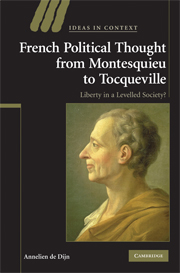Book contents
- Frontmatter
- Contents
- Acknowledgements
- Introduction
- 1 Political thought in eighteenth-century France: the invention of aristocratic liberalism
- 2 Liberty and inequality: the royalist discourse
- 3 A society of equals: the liberal response
- 4 Liberty in a levelled society: Charles Dunoyer, Benjamin Constant, and Prosper de Barante
- 5 The new aristocracy: a theme in Restoration liberalism
- 6 The danger of democracy: Orléanist liberalism and Alexis de Tocqueville
- 7 The French predicament: aristocratic liberalism in the Second Empire
- Epilogue
- Bibliography
- Index
- IDEAS IN CONTEXT
2 - Liberty and inequality: the royalist discourse
Published online by Cambridge University Press: 22 September 2009
- Frontmatter
- Contents
- Acknowledgements
- Introduction
- 1 Political thought in eighteenth-century France: the invention of aristocratic liberalism
- 2 Liberty and inequality: the royalist discourse
- 3 A society of equals: the liberal response
- 4 Liberty in a levelled society: Charles Dunoyer, Benjamin Constant, and Prosper de Barante
- 5 The new aristocracy: a theme in Restoration liberalism
- 6 The danger of democracy: Orléanist liberalism and Alexis de Tocqueville
- 7 The French predicament: aristocratic liberalism in the Second Empire
- Epilogue
- Bibliography
- Index
- IDEAS IN CONTEXT
Summary
To the publicists and political thinkers who came to maturity during the July Monarchy or the Second Empire, the Restoration period seemed in retrospect to have been a period of vigorous and intellectually elevated ideological strife. In 1841, the historian and liberal-Catholic political thinker Louis de Carné looked back nostalgically on the years between 1814 and 1830 as a time in which there was still a debate between ‘great political schools’, when orators and politicians defended great political principles rather than their own petty interests. Likewise, Alexis de Tocqueville was to call the Restoration the time of ‘great issues’ and ‘great parties’, contrasting it favourably with the July Monarchy and the Second Empire.
The vibrancy of Restoration debate was to an important degree stimulated by the prominent political and intellectual role of the heirs of the Counter-Revolution, the royalists (also described as ultra-royalists or ultras by their political opponents). While Louis XVIII's supporters were initially disappointed with the settlement of 1814 – which, despite the return of the Bourbon dynasty to France, did not restore the monarchy of the Old Regime but instead introduced an English-style constitutional monarchy with a bicameral legislature – they quickly adapted to the new situation. The royalists transformed themselves into a political party with a more or less disciplined parliamentary faction and electoral associations, as well as founding their own political journal, Le Conservateur, to influence public opinion.
- Type
- Chapter
- Information
- French Political Thought from Montesquieu to TocquevilleLiberty in a Levelled Society?, pp. 40 - 67Publisher: Cambridge University PressPrint publication year: 2008



